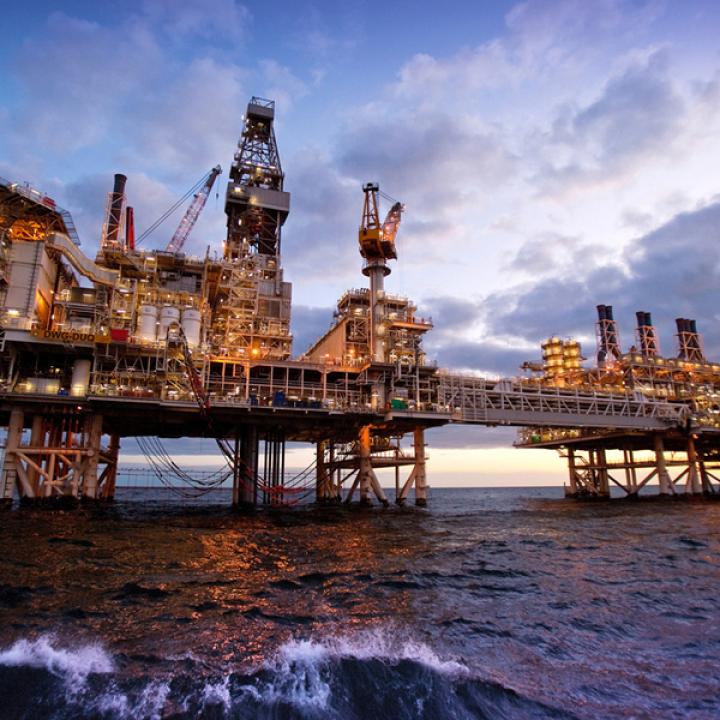
- Policy Analysis
- Policy Alert
Natural Gas Judgement Casts Shadow Over Israel's Energy Plans

A new court decision could stunt exploitation of offshore gas reserves, open the possibility of a heavy punitive arbitration award, and hamper foreign investment in Israel.
On March 27, the Israeli High Court passed a judgement condemning a key aspect of the government's planned "framework" deal with energy companies hoping to tap the country's largest offshore natural gas field. The companies in question -- Houston-based Noble Energy and its Israeli partner Delek -- had pressed for a ten-year regulatory and pricing stability clause to facilitate the investment of around $6 billion needed to develop the giant Leviathan field, which lies eighty miles west of Haifa deep below the Mediterranean Sea. The court rejected that clause, ruling that the deal should be suspended for another year and requiring the government to amend the terms and obtain approval from parliament.
Prime Minister Binyamin Netanyahu described the judgment as "bizarre," arguing via Twitter that it "severely threatens the development of Israel's gas reserves." He continued: "Israel is seen as a country with exaggerated legal interference that makes doing business hard. We will seek alternative ways to overcome the serious harms inflicted on Israel's economy by this hard to understand resolution." Similarly, energy minister Yuval Steinitz called the judgement "miserable," while Noble chief David Stover stated, "The court's ruling...is disappointing and represents another risk to Leviathan timing. Development of a project of this magnitude, where large investments are to be made over multiple years, requires Israel to provide a stable investment climate...It is now up to the government of Israel to deliver a solution which at least meets the terms of the Framework, and to do so quickly." If the issue cannot be resolved, Noble could resort to international arbitration against Israel, with a potential punitive award of up to $12 billion.
The ruling's immediate consequence is to once again delay development of the Leviathan field, where the companies stopped working in December 2014 after the Israeli oil and gas regulator abruptly decided to reverse tentative approval of a compromise that would have spared the venture from being labeled a monopoly. The issue has since become a political football, with opposition parties and activist groups claiming that the likely price for Leviathan gas will be unreasonably expensive and the profits for Delek and its Israeli partners too high. Netanyahu's government, which survives with a single-seat majority in parliament, has countered by emphasizing the resultant boost to government revenues and Israel's need to attract foreign investment. The government had intended to issue new tenders this summer for more exploration, but enticing foreign gas companies with the necessary skills and financial reserves to drill in water 6,000 feet deep -- where even an empty hole costs $100 million -- could be challenging.
At present, Israel depends on gas from the offshore Tamar field, drilled by Noble in 2009 and in production since 2013. Less than half the size of Leviathan, it fuels nearly 60 percent of Israel's electricity production. The government's plans -- now delayed if not derailed -- are to increase the number of gas-fired power stations for domestic and industrial use while exporting surplus gas. Neighboring Jordan will receive a small amount of Tamar gas beginning next year, though plans for the multiyear sale of large volumes of Leviathan gas are on hold.
Meanwhile, gas development continues in other parts of the Eastern Mediterranean after years of quiet encouragement by the United States. In Cyprus, Noble discovered the Aphrodite field, which lies mainly in the island's exclusive economic zone and stretches partly into Israel's EEZ as well. Cypriot officials are currently trying to attract more companies to drill there. And last year the Italian conglomerate Eni found the Zohr field in Egypt's EEZ; even bigger than Leviathan, it lies only three miles from Egypt's maritime border with Cyprus. Various actors have drawn up elaborate schemes for Israel, Cyprus, Egypt, and Greece to cooperate in using and exporting this gas. Even Turkey, currently reliant on expensive Russian, Iranian, and Azerbaijani gas, had contemplated buying Israeli supplies -- a commercial decision that would require political rapprochement with both Jerusalem and Cyprus, and which may be further complicated by the latest court judgement.
In short, hopes of Israel becoming a mini-energy giant in the Eastern Mediterranean have seemingly evaporated in little more than a year. Yesterday's decision flies in the face of commercial realities inherent to twenty-year, high-cost energy projects. Theoretically, the parliament could pass a law allowing for the ten-year stability clause, but Netanyahu would likely be opposed by coalition partners eager to force new elections. Noble might also be able to obtain a different set of assurances that are acceptable to all parties. Without such a breakthrough, resolving the impasse would require broader societal awareness of the benefits of natural gas wealth and domestic political compromise, yet the prospects for either -- never mind both -- seem slim.
Simon Henderson is the Baker Fellow and director of the Gulf and Energy Policy Program at The Washington Institute.



